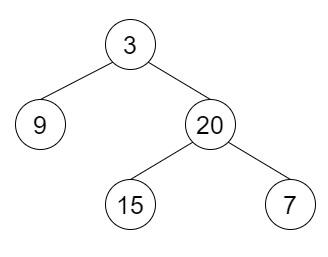
 Data Structure
Data Structure Networking
Networking RDBMS
RDBMS Operating System
Operating System Java
Java MS Excel
MS Excel iOS
iOS HTML
HTML CSS
CSS Android
Android Python
Python C Programming
C Programming C++
C++ C#
C# MongoDB
MongoDB MySQL
MySQL Javascript
Javascript PHP
PHP
- Selected Reading
- UPSC IAS Exams Notes
- Developer's Best Practices
- Questions and Answers
- Effective Resume Writing
- HR Interview Questions
- Computer Glossary
- Who is Who
Average of Levels in Binary Tree in C++
Suppose we have a non-empty binary tree; we have to find the average value of the nodes on each level in the return the average values as an array.
So, if the input is like

then the output will be [3, 14.5, 11].
To solve this, we will follow these steps −
Define an array result
Define one queue q
insert root into q
-
while (not q is empty), do −
n := size of q
Define an array temp
-
while n is non-zero, do −
t := first element of q
insert value of t into temp
delete element from q
-
if left of t is not null, then −
insert left of t into q
-
if right of t is not null, then −
insert right of t into q
(decrease n by 1)
-
if size of temp is same as 1, then −
insert temp[0] at the end of result
-
otherwise when size of temp > 1, then −
sum := 0
-
for initialize i := 0, when i < size of temp, update (increase i by 1), do −
sum := sum + temp[i]
insert (sum / size of temp) at the end of result
return result
Example
Let us see the following implementation to get a better understanding −
#include <bits/stdc++.h>
using namespace std;
void print_vector(vector<auto> v){
cout << "[";
for(int i = 0; i<v.size(); i++){
cout << v[i] << ", ";
}
cout << "]"<<endl;
}
class TreeNode{
public:
int val;
TreeNode *left, *right;
TreeNode(int data){
val = data;
left = NULL;
right = NULL;
}
};
void insert(TreeNode **root, int val){
queue<TreeNode*> q;
q.push(*root);
while(q.size()){
TreeNode *temp = q.front();
q.pop();
if(!temp->left){
if(val != NULL)
temp->left = new TreeNode(val);
else
temp->left = new TreeNode(0);
return;
}
else{
q.push(temp->left);
}
if(!temp->right){
if(val != NULL)
temp->right = new TreeNode(val);
else
temp->right = new TreeNode(0);
return;
}
else{
q.push(temp->right);
}
}
}
TreeNode *make_tree(vector<int> v){
TreeNode *root = new TreeNode(v[0]);
for(int i = 1; i<v.size(); i++){
insert(&root, v[i]);
}
return root;
}
class Solution{
public:
vector<float> averageOfLevels(TreeNode *root){
vector<float> result;
queue<TreeNode*> q;
q.push(root);
while (!q.empty()) {
int n = q.size();
vector<float> temp;
while (n) {
TreeNode* t = q.front();
temp.push_back(t->val);
q.pop();
if (t->left && t->left->val != 0)
q.push(t->left);
if (t->right && t->right->val != 0)
q.push(t->right);
n--;
}
if (temp.size() == 1)
result.push_back(temp[0]);
else if (temp.size() > 1) {
double sum = 0;
for (int i = 0; i < temp.size(); i++) {
sum += temp[i];
}
result.push_back(sum / temp.size());
}
}
return result;
}
};
main(){
Solution ob;
vector<int> v = {3,9,20,NULL,NULL,15,7};
TreeNode *root = make_tree(v);
print_vector(ob.averageOfLevels(root));
}
Input
{3,9,20,NULL,NULL,15,7}
Output
[3, 14.5, 11, ]

